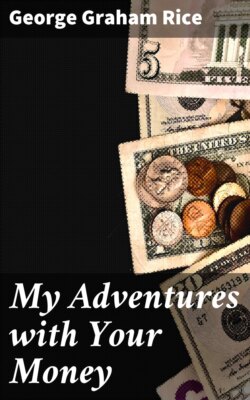Читать книгу My Adventures with Your Money - George Graham Rice - Страница 9
На сайте Литреса книга снята с продажи.
THE PUBLIC ASKS TO BE MYSTIFIED
ОглавлениеTable of Contents
The judges were apparently satisfied, but the public could not readily understand the truth, and we didn't point it out in our advertisements, because our policy was always to appear as mysterious as possible as to the source of our information.
Mystery played an important rôle in our organization, and it would have been better had we never succeeded in the Smoke coup. Up to this time my personal identity had not been revealed at the race-track, and even the bookmakers did not know who was the guiding spirit of Maxim & Gay. "Jimmy" Rowe, trainer for James R. Keene; Peter Wimmer, trainer for Captain S. S. Brown of Pittsburg, and John Rogers, trainer for William C. Whitney, were at this early period at various times the rumored sponsors for Maxim & Gay. The bookmakers and "talent" generally conceived the idea that nobody but a very competent trainer in the confidence of horse owners could possibly be responsible for so much exact information regarding the horses. Of course, the track officials who made it their business to know everything knew of my connection with the organization. No sooner, however, did their messengers ask an interview with me than the fact became public property around the race-track and the mask was off.
The effect for a while was very bad, for our business fell off considerably. "Bismarck" Korn, the well-known German bookmaker, put it to me this way on the day of the Smoke incident:
"You are the first horse tipster I effer saw dat vore eyeclasses, sported a cane, und vore tailor-made cloding. You look like a musicianer—not like a horseman. You're a vonder!"
Gottfried Walbaum, another old-time bookmaker, chimed in: "Dat vas obdaining money under false bredenses. I gafe your gompany dwendy-fife dollars a veek for two months alreaty. You gif me my money pack! You are a cheater!"
Riley Grannan, the plunger, said, "Got to hand it to you, kid! Any time you can put one over on the Weisenheimers that have been making a living on race-tracks for twenty years you are entitled to medals!"
The attitude of "Bismarck" and of Walbaum was amusing, that of Grannan flattering. But it was poor business, because most of these professional race-track people ceased for a while to subscribe for the Maxim & Gay service.
For months I had purposely kept myself in the background, fearing a dénouement of this very description. I recalled that in the late 80's, in a town of northern Vermont, when John L. Sullivan was advertised to appear in a sparring exhibition, his manager met him at the train, and, although it didn't rain and the sun didn't shine, an umbrella was raised to cover John L. while walking from the train to a waiting landau. No sooner did Sullivan enter the vehicle than the blinds were drawn. When the carriage reached the hotel, it stopped before a side door. The manager alighted before Sullivan, again quickly raised the umbrella and whisked the heavy-weight champion past the crowds and up to his room without exposing him to the view of anybody whatsoever.
Throughout the day Sullivan was screened from public gaze. His face was not seen by a single citizen of the town until he appeared on the stage that night.
I asked the manager why he was so very careful to shield Sullivan from the popular view prior to his appearance before the footlights. I recall that he said:
"If the public thought John L. was just an ordinary human being with black mustaches and a florid Celtic face, they wouldn't go to see him. The public demand that they be mystified, and to have shown people off the stage that Mr. Sullivan is just a plain, ordinary mortal would disillusion them and keep money out of the house."
That piece of showman's wisdom was fresh in mind during the early career of Maxim & Gay; and so long as Maxim & Gay kept race-track men guessing as to who was directing its destinies, the organization was a howling success. Its good periods were mixed with bad periods after the mystery of sponsorship was cleared up to the satisfaction of the professionals by the inquiry of the race-track judges into the Smoke affair.
A few weeks after the Smoke coup, our chief clocker informed us that the entries for a big stake race which would be run on the following Saturday had revealed to him a "soft spot for a sure winner," as he expressed himself, and he said we could advertise the happening in advance with small chance of going wrong. This we proceeded to do.
Money poured in by telegraph from distant cities for the "good thing" on Saturday. Our advertisement on the Thursday previous to the race read like this:
